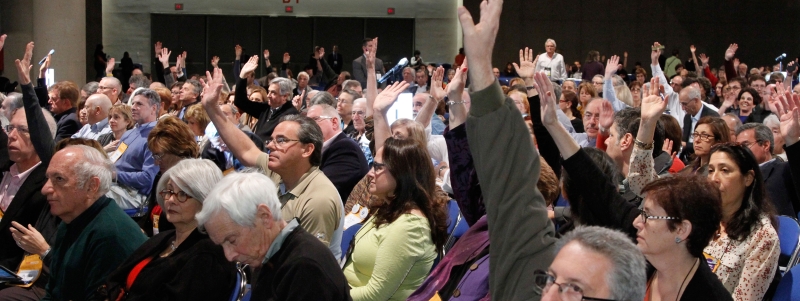59th General Assembly
November 1987
Chicago, Illinois
BACKGROUND
Two years ago, the Union of American Hebrew Congregations issued a call to action on AIDS. We called for increased financial and human resources for prevention and treatment, prohibition of discrimination, and community education about this terrible new epidemic. We created our own Committee on AIDS, which has developed and distributed our sacred teachings with professional expertise.
Tragically, the epidemic continues to rage, and more needs to be done. An estimated two million Americans are already infected with the AIDS virus. Most, if not all, will suffer chronic immunological and/or neurological problems throughout their lifetimes. At the current rate of infection, the federal government estimates that millions more will become so infected by 1991. yet, the process of developing new treatments which combat AIDS virus infection and restore immune functioning have been severely hampered by the lack of adequate funding and unnecessary political obstacles.
We find society today dangerously paralyzed by partisan moral agendas as the acute crisis of the epidemic continues. The best evidence of the damage inflicted by the polarization of American society is the ineffectiveness of the President's Commission on AIDS.
With increased public awareness and fear have come proposals for mandatory AIDS testing of various segments of our population. Those most knowledgeable in the field of public health have opposed these proposals. They argue persuasively that mandatory testing is ineffective as a public health measure because it will open the door to increased discrimination against People with AIDS (PWA), will inevitably drive underground these members of high risk groups whom we most need to reach, and will distract the public from the imperative tasks of education, counseling, and behavior modification.
THEREFORE, BE IT RESOLVED that the Union of American Hebrew Congregations:
- Express profound appreciation to the United States surgeon General, Dr. C. Everett Koop, for his courageous leadership in educating the American people of all ages to the realities of AIDS.
- Join those who:
- Argue that any testing must be accompanied by education, counseling, and confidentiality consistent with sound public health practice.
- Affirm that those infected with the AIDS virus must be protected from all forms of discrimination, such as discriminatory housing, employment, and health care delivery practices.
- Associate ourselves with those who support voluntary testing and oppose mandatory testing for AIDS.
- Call upon every individual to accept responsibility to observe those health practices which minimize the risk of infection.
- Call on every congregation to:
- Affirm the mitzvah of Pekuach Nefesh (the saving of lives) by instituting comprehensive, effective, and age-appropriate educational programs about preventing transmission of the AIDS virus.
- In the spirit of Bikur Cholim (visiting the sick) reach out to individuals infected with the AIDS virus, their families, and their friends by providing food, clothing, legal assistance, transportation, and empathetic listening.
- Form and join area coalitions to develop action programs for the prevention of AIDS and assistance to those with the disease.
- include appropriate sex education at every level in religious schools.
- Applaud the efforts of the National Leadership Coalition on AIDS, which brings together leaders of business, industry, non-profit organizations, religious groups, minority communities, and government representatives in an attempt to forge a compassionate response to AIDS.
- Call on federal, state or provincial, and local government to:
- Provide financial incentives to encourage nursing homes, hospices, and home care as alternatives to hospitalization for people infected with the AIDS virus since such hospitalization is enormously expensive and is often unnecessary when alternative treatment centers are available.
- Dramatically expand drug treatment programs to prevent the spread of the AIDS virus through intravenous drug use.
- Call on professional schools to provide more training to physicians, nurses, dentists, social workers, clergy, and other helping professionals on ways of helping people infected with the AIDS virus and their loved ones.
- Call on the National Institute of Health, the Food and Drug Administration, pharmaceutical companies, and other relevant parties to vigorously expedite the testing and distribution of new drugs which show promise in the treatment of the AIDS virus infection.
- Call upon the leaders of business and industry to develop intelligent and compassionate policies to protect the rights and health of all employees.
Give to the URJ
The Union for Reform Judaism leads the largest and most diverse Jewish movement in North America.

